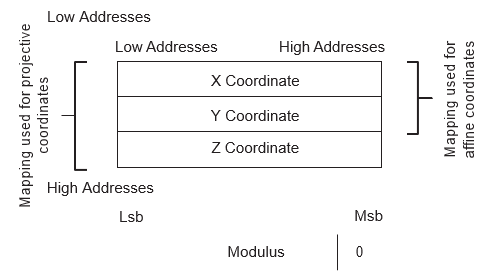43.3.7.1 Parameters Format
Polynomials in GF(2n)
Polynomials in GF(2n) are binary polynomials reduced modulo the polynomial P[X]. This polynomial is called the modulus and may be abbreviated to P in this document. The storage of these polynomials in memory area is described in Aligned Significant Length.
For notation simplicity the comparison signs “<“ or “>” may be used for polynomials, this is to be interpreted as a comparison between the degree of the polynomials.
In GF(2n) fully reduced polynomials are of degree strictly lower than degree(P[X]). In many cases the polynomials used in this library are only partially reduced and so have a degree higher or equal than degree(P[X]), but this degree is maintained strictly lower than (degree(P[X]) + 15).
Coordinates System
In this implementation, several choices have been made related to the coordinate systems managed by the elliptic curve primitives.
There are two systems currently managed by the library:
- Affine Coordinates System where each curve point has two coordinates (X,Y)
- Projective Coordinates System where each point is represented with three coordinates (X,Y,Z)
Converting from the affine coordinates system to a projective coordinates system and is performed by extending its representation having Z = 1:
(X,Y) ⇒ (X,Y, Z= 1)
Converting from a projective coordinate to an affine one is a service offered by the library. The formula to perform this conversion is:
(X,Y, Z) ⇒ (X ⇒ Z,Y/Z2)
Points Representation in Memory

In this figure, the modulus is represented as a reference, and to show that coordinates are always to be provided on the length of the modulus plus one 32-bit word.
Different types of representations are listed here:
- The minimum value for u2ModLength is 12 bytes. Therefore, the significant length of the modulus must be at least three 32-bit words.
- In some cases the point can be the infinite point. In this case it is represented with its Z coordinates equal or congruent to zero.
Modulus and Modular Constant Parameters
In most of the services the following parameters must be provided:
- P the Modulus (often pointed by {nu1ModBase,u2ModLength +
4}): This parameter contains the Modulus Polynomial P[X]
defining the Galois Field used in points coordinates
computations. The Modulus must be u2ModLength bytes long,
while having a supplemental zeroed 32-bit word on the MSB
side.Note: Most of the Elliptic Curve computations are reduced modulo P. In many functions the reductions are made with the Fast Reduction.
- Cns the Modular Constant (often pointed by {nu1CnsBase,u2ModLength + 12}): This parameter contains the Modular Constant associated to the Modulus.
Curve Parameters in Memory
Some services need one or both of the Elliptic Curve Equation Parameters a and b. In this case these values are organized in memory as follows:
- The a Parameter relative to the Elliptic Curve Equation (often pointed by {nu1ABase,u2ModLength +4}). The a Parameter is written in a classical way in memory. It is u2ModLength bytes long and has a supplemental zeroed 32-bit word on the MSB side.
- The a and b Parameters relative to the Elliptic Curve
Equation (often pointed by {nu1ABBase,2*u2ModLength +
8}):
- The a Parameter is written in memory on u2ModLength bytes long, with a supplemental zeroed 32-bit word on the MSB side.
- The b Parameter is written in memory after the a Parameter at an offset of (u2ModLength + 4) bytes. It is written in memory on u2ModLength bytes long, with a supplemental zeroed 32-bit word on the MSB side.
